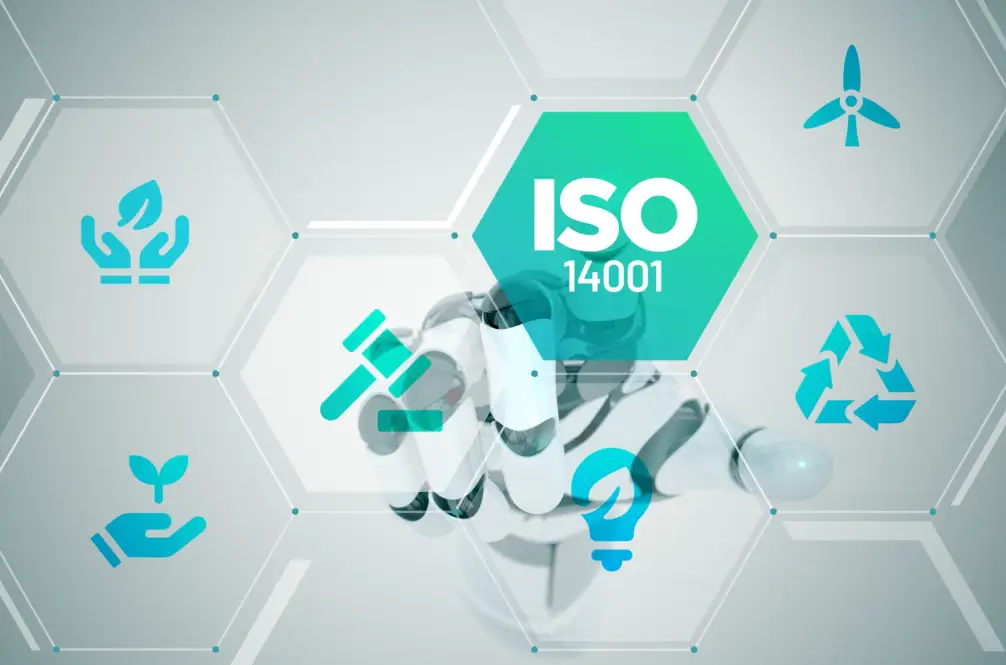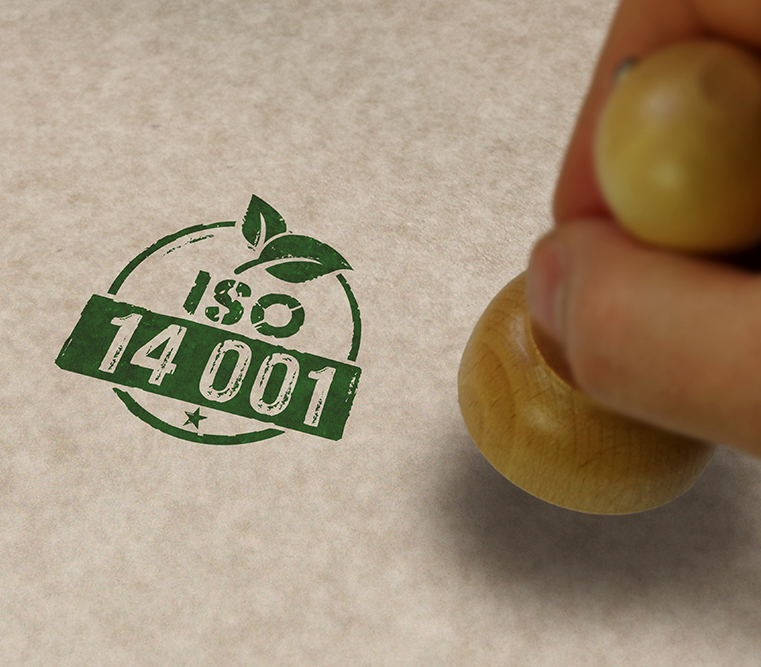QIC Global and Bluewolf operate as a single entity.
QIC Global and Bluewolf operate as a single entity.
Implement the global standard for the environmental management systems under a reputable and accredited certification body.
Have a hassle-free certification experience under Blue Wolf!

ISO 14001 is the internationally acknowledged environmental management standard that helps organizations plan, implement and measure how to minimize their impact on the environment.
ISO certification confirms and communicates a company’s ethical, sustainable and nature-friendly philosophy in their day-to-day operations.
The standard offers a set of practical guidelines for any organization to be more environmentally friendly by defining the purpose, objectives, and requirements for implementing an environmental management system effectively.
Certification to ISO 14001 helps organizations strengthen their brand image and acquire the trust of the customers and the community.
Established in the year 1996, ISO 14001 aims to help organizations of all sizes and types to understand the importance of environmental management and sustainability and develop plans to modify their operational activities to reduce harmful impact. The current version used globally is ISO 14001: 2015 with the same aim and objectives.

ISO 14001 establishes a framework for organizations to reduce harmful impacts on the environment. Customers generally want to work with companies that care for the environment and are mindful of sustainability. With the help of ISO certification, organizations can exhibit that they are concerned about environmental and community welfare. The standard helps a company define its environmental philosophy, responsibilities, plans and actions and pushes them to conform to a standardized practice of reducing resource use and environmental impact.

Every company needs to understand the environmental legislation as well as the regulations stipulated for their particular industry. The certification encourages companies to understand all they need to comply with for the safe and ethical conduct of business.

The standard helps us to understand the value of resources. Organizations implementing ISO 14001 take responsibility for their actions relating to utilizing resources and learning to use them more productively. By reducing the level of unnecessary waste, companies manage to run a lower-cost operation.

ISO 14001 certification brings international recognition, making a company an example in their market. Organizations gain a competitive edge and attract more customers.

Today, customers prefer to get products/services from an environmentally friendly and aware company. If a company fails to take care of the environment in their operations and management, ignore community and sustainability, they are likely to lose their customer base. ISO 14001 helps to maintain positive customer relationships, which subsequently supports customer retention.
1. Resource Management : One of the major requirements / outcomes of ISO 14001 is resource management. The standard requires companies to understand the importance of resources and infrastructure and design strategies to utilize them with minimum waste for maximum productivity.
2. Environmental impact : Companies need to understand how their operations make an adverse impact on nature. Accordingly, they should devise measures to improve their actions and make environmentally friendly business decisions. A sustainable approach towards the environment is the main component of a successful environmental business strategy and ISO 14001 compliance.
3. Review, analysis, and constant improvement : According to the final clauses of ISO 14001, there should be constant monitoring of the implemented system to determine if the expected performance is being achieved. Continual development of the management system should be part of the organization culture so that business continuity can be achieved.
4. Accountability of the management : Accountability of management refers to the focus and engagement required of management to meet environmental management expectations. Responsible management lead, provide resources, monitor and collect performance data.

Commit - A trusted certification body is chosen, engaged, and an audit date is set.
Pre-assessment - If the clients wish, an assessment before stage 1 and 2 audits is performed.
Stage 1 Audit - The management system and documentation are reviewed to ensure everything is in place for the stage 2 audit, including determining whether internal audit and the management review have been performed. An audit report is prepared and issued by the auditor for review. If everything looks good, the auditor confirms the stage 2 audit.
Stage 2 Audit - After addressing any concerns or opportunities for improvement from the stage 1 audit, the stage 2 audit is conducted by the auditor. The auditor checks that the management system is implemented and is compliant with ISO 14001. If there are any non-conformities, these are shared by the auditor. Once non-conformities are addressed and the auditor can confirm that the standard is being met, the auditor recommends the company for certification.
Issuing the certification - With the successful completion of the two stages of audits, the certification body issues the certification.
Surveillance Audits - Every certification lasts for 3 years. The certification body organizes annual audit programs to ensure ongoing compliance.

Blue Wolf is a business associate of various accredited certification bodies. We audit you to determine if you meet the requirements of ISO 14001:2015. Once confirmed and certified, and to ensure 100% ongoing compliance, Blue Wolf continues to work with you through annual surveillance and recertification audits when your certificate expires.
Our auditors will help your certification experience be the best possible. We aim to help your organization achieve global acknowledgment if it effectively fulfills all the criteria.
Our audit programs are designed to ensure that your management system successfully conforms to the clauses of ISO 14001 as well as the policy objectives of your company. We are available to meet with you and offer exceptional customer care support. Talk to our experts or directly hire us to complete your certification journey.
See what our clients have to say about Blue Wolf
“We used Blue Wolf based on a recommendation. It was really about the sustained support that it sounded like they would be able to offer us as we not only sought to achieve our ISO certification but maintain it and make improvements and possibly explore other certifications from the ISO wheelhouse.”
Q: What would you say to those who are considering Blue Wolf for their ISO certification audit?
A: “I think Blue Wolf makes a great partner for not only getting but maintaining your ISO certifications. Our auditor was extremely knowledgeable and met us in the middle on a lot of things and didn’t just take us at face value, they also gave us commentary for improvement and gave us a lot of direction on how to continually improve instead of just moving through non-compliances or moving through things that were just adequate enough, and so that was very helpful.”
Q: What would be the reasons that you would recommend Blue Wolf to other people?
A: “The ease, the availability, and just kind of the speed and the response time that we got from them.”
Director of Operations, Integrity BioChem
“Blue Wolf was a fantastic auditor. I would absolutely recommend them for any ISO certification. Very, very easy to work with and communicated very well.”
“Our auditor was fantastic. Very, helpful, very informative, very understanding, and took the time to answer questions, and was very, very easy to work with. Very nice. I know sometimes, some of the auditors can be a little cold and short but our auditor was very fantastic and she just helped out a lot.”
“Blue Wolf’s service was fantastic. They really helped out filling in the little gaps that we didn’t know we had and just made the audit process very, very easy.”
“Blue Wolf streamlined the entire process. They were very easy to communicate with and work with, very cordial, and just an all-around good experience.”
Quality Manager, Unity Tactical
“We chose Blue Wolf as a recommendation from Compliancehelp and we found the process to be as smooth with Blue Wolf as it has been with our consultant.”
“We worked with Seth from Blue Wolf as our auditor, and I’ve maintained dialogue with him for future audits. The support that we obtained from Seth because it was a newer accreditation was absolutely fantastic.”
“The service provided by Blue Wolf has been second to none. The open communications, the information that’s given to us, the whole process is explained from agenda being set throughout the audit, to the close of the audit, and the issuant of the certification.”
“I’d simply say go for it because they worked hand in hand with our consultant at the time. Going forward, I’ll be using them for this year as well.”
“Absolutely recommend Blue Wolf. The service that they provided was excellent. Going forward, because we’re a global business, as we go to search for accreditations across other areas of the globe, we’ll be utilizing Blue Wolf for the certification requirements.”
Quality Manager, Lowe Rental
“I found Blue Wolf to be the Cheapest and most experienced in my eyes ‘cause all of the price ranges were higher than Blue Wolf, so I stuck with Blue Wolf. Their quality was very high as well.”
Q: What would you say to those who are considering Blue Wolf for their ISO certification audit?
A: “They’re gonna get the most bang for their buck out of it. They’re gonna charge the cheapest out of the other companies and give you a high standard of quality work.”
CEO, Alvarez Wind Energy Services LLC.
“Would give them a 10 out of 10 and would highly recommend them to anybody looking to get ISO certification in the future.
The audit was very very smooth.
The day one audit was helpful, because although there weren’t any findings made he did make some recommendations to our QMS and our on-time delivery matrix which we incorporated on that same day, once again with Lee’s help We updated our QMS same day, got it to the auditor and he was very happy to see the changes we had made, even though they weren’t going to be any findings they were just recommendations, I think it did smooth the process through.
Seth was fantastic, very easy to work with, once we got through the time zone issues, very professional, knew what he was doing, knew where to look, and I assume he knows where the holes typically are. He also made a lot of accommodations to where we are in the world and helping us getting that certification.”
President, Electrical Contact International
“We were very happy with the service, and I would definitely recommend them for anybody who is looking to gain ISO accreditation.
The auditor was very knowledgeable, very understanding, very helpful.
It wasn’t just a scrutiny of your documentation and processes, it was actually a helpful process, constructive in the feedback that was given.
The auditor was very professional throughout the whole process. Very punctual, always on time, ready to go.
Was again open and honest about the whole process, so myself and business partner knew exactly what to expect for each day for each part of the process.
Yes, I would recommend Blue Wolf. They were very professional throughout the whole process. The auditors were very knowledgeable and helpful and made the whole process of the ISO external audit very easy and comfortable, and we would definitely recommend for anyone looking to gain ISO accreditation.”
Founder, Elite Wind.
It’s a very great experience. She (Tanya) helped me a lot and she explained a lot. If there is something that we might need to improve on, she will explain in a very detailed way. It’s a very smooth and very clear process. Definitely recommended.
CEO, HQS Automotive.
Our experience has been that this process in working with the auditors has shown us more ways to improve internally than what we expected
Founder, Art Advertising
One of the best business decisions I think we’ve made in the entire time we’ve been here in the company.
Founder, Art Advertising
When we first started the process of looking at the standard, we were afraid we would have to force our company into a new way of doing almost everything in doing our business. And we were very pleased to find out that the standard was meant to fit how we already were doing things. And Blue Wolf and Seth really helped us in the audit to not feel so intimidated by it, but to understand it, yes that the way we are doing it does fit the standard, and instead of just criticizing where we were coming short, he gave us advice and suggestions on how the standard is actually meant to be used, to improve how we are doing things, not to force us into a certain way of somebody else doing it.
Our experience has been that this process in working with the auditors has shown us more ways to improve internally than what we expected, and we would recommend going through this for anybody that’s considering it.
Founder, Art Advertising
After a lot of research and careful review of our options we chose to work with Blue Wolf, and we know now that we made the right decision. It’s been a great process, and I would recommend to anyone that is considering ISO 9001 to at least have a conversation with them. I don’t think you would regret it at all.
At the very beginning of this process, I think we can safely say we were very nervous about it and apprehensive about doing it. After our auditor Seth Shea arrived, we realized again what a great decision we made. He’s made this process way much easier than we thought it might be, not as scary. And the insight he’s given us, and the observations and suggestions has been one of the most… really one of the best business decisions I think we’ve made in the entire time we’ve been here in the company.
Founder, Art Advertising
Firstly, on behalf of Adam and myself, we would like to thank you both very much for providing us with the support and service during our ISO accreditation and certification process.
Your professional and knowledgeable approach and support has been very much appreciated.
Mechpro
The experience was overwhelmingly really good. I thought we were ready but there were some lightbulb moments. It was a logical process. The auditor was patient. We wanted the certification for areas of opportunity and we had many recommendations. I appreciated the audit. I haven’t heard anything negative out of the process to date. It’s been good.
Affordable Staff
I’ve never been involved in auditing before. Completely new. Was not sure what to expect. The process was seamless. There were some good recommendations. I was made to feel comfortable. The process worked quite well. I’m feeling more than ready for the next audit. There was so much going on at the time of the audit that I just wanted to go back to the audit, it was more relaxing.
Affordable Staff
“One of the greatest things that initially sold me on BLUE WOLF was your approach towards partnering, understanding, and treating us with respect towards where we are at in compliance with the standard.“
“I was nervous about it until we spoke on the phone in the premeeting. Once you started talking about your approach and your process I was sold. But to see it in real life and to see it actually come true was even more (…)”
After his first day of the audit: “I’ve been through so many audits you can’t even count. Your approach is by far superior than any other audit I’ve ever been through. The contrast was night and day. I’ve got some younger people who don’t have quite the same experience as I do, and their ability to feel like they could be participatory, have value and be respected throughout the process was outstanding. I have not made a better choice in picking a company to work with us in an audit process prior to you. You’re going to be here every year if I can help it. And if ownership changes and they want to do something different, I’ll fight to keep this process going because it has so much value.”
Imerys
I’ve never been a part of one of these. I have learned absolutely so much. It was a privilege to be a part of this. I don’t ever want to experience an audit a different way.
Imerys, Quality Manager
If everybody could have an audit experience like this, more and more people would actually consider an ISO certification. Because so many people hear so many things about it, stressful myths, and everyone has a bad auditor experience from somewhere else. If more people could experience an audit this way, they wouldn’t have any reason to fear ISO.
CHS Broadbent, National EMS Director
I’ve seen some really bad crap auditors. Even I learned a whole lot from what we just went through with Seth that I didn’t even understand about the standard before.
Automated Wellhead. Operations manager
“Blue Wolf has been great with providing us with clarity and direction so that our team can focus on the important aspects of our quality and safety management systems. What seemed like a very intimidating process to achieve ISO accreditation was made simple by Blue Wolf and their team. Their knowledge and our processes have added value and elevated our quality and safety program to another level. Thank you, Seth Shea, and the Blue Wolf team for a wonderful ongoing experience.”
Safety Administrator, Clark Bros, Inc.